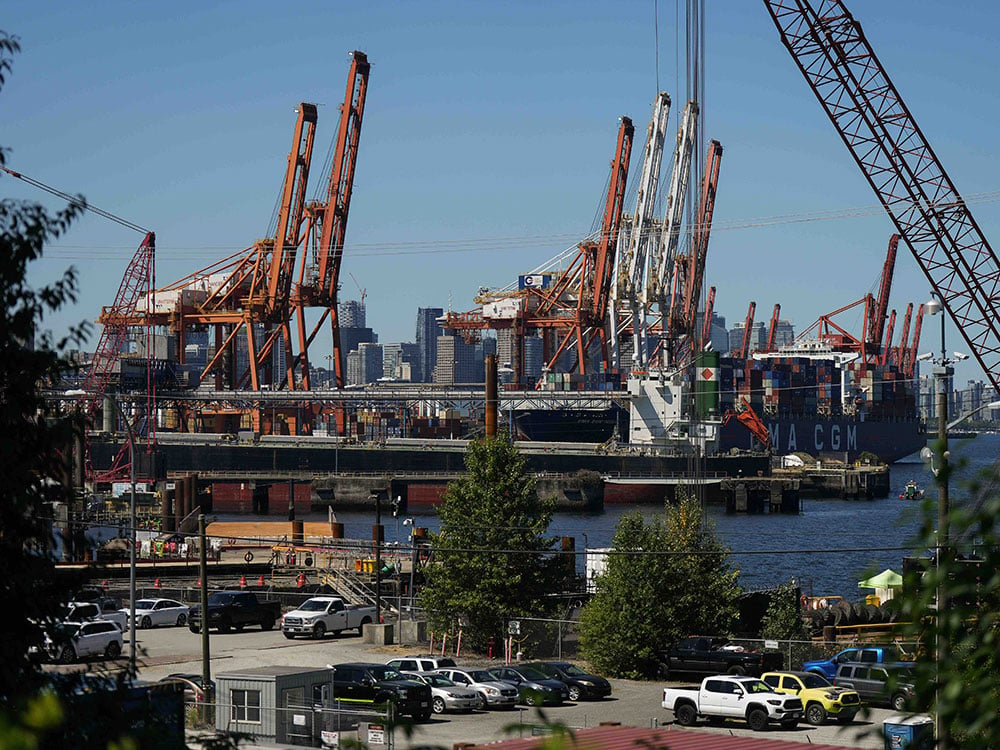Story updated on July 21 at 10:52 a.m. to reflect developing updates on the strike.
B.C. dockworkers have once again reached a tentative deal with employers, potentially signalling the end to a strike that has snarled supply chains for weeks and sparked calls for the federal government to force workers back to the job.
The International Longshore and Warehouse Union's contract caucus — made up of 70 elected delegates from five member locals — will vote again on Friday on whether to accept a four-year tentative agreement with the BC Maritime Employers Association, which represents 49 businesses at ports in the Lower Mainland and Prince Rupert.
That caucus voted narrowly to reject that same agreement earlier this week. The Tyee was first to report that they would vote on the agreement again at an emergency meeting on Friday, something ILWU Local 502 president Rick Huburtise later confirmed in a statement to his membership on Thursday night.
The four-year deal, reached with the assistance of federal government mediators, would have provided a compounded wage hike of 19.2 per cent over four years, plus a signing bonus and increases to a retirement fund.
The ILWU caucus narrowly voted to reject the agreement because it did not do enough to protect jobs from outsourcing and automation, ILWU president Rob Ashton told The Tyee in an interview Tuesday.
Ashton’s office said he was not available to comment for this story and did not confirm or deny the information obtained by The Tyee.
One source close to negotiations told The Tyee that the ILWU decided to hold a second vote because of pressure from the federal Liberals, who had pledged to do whatever was needed to end the strike. The government has not ruled out recalling Parliament to pass back-to-work legislation.
Hartley Witten, press secretary for federal Labour Minister Seamus O’Regan, told The Tyee Wednesday they had been regularly updating opposition parties on the port strike.
But one government source, speaking on background, told The Tyee the government did not discuss back-to-work legislation with Opposition parties.
The strike, which began July 1, has snarled Canada’s supply chains and disrupted billions of dollars in trade, according to business groups.
The union wanted higher wages and job protection against contracting out and automation.
That strike ended on July 13 after the ILWU’s negotiating team and employers accepted a tentative deal proposed by a federal mediator.
But before ILWU members voted to ratify that agreement, it had to be approved by the union’s contract caucus, something required by the union’s constitution.
On Monday, that caucus narrowly voted to reject that agreement.
On Tuesday, Ashton said delegates wanted a two-year agreement, given the uncertainty around cost-of-living increases. He also said they wanted stronger job protection, especially given the record profits made by shipping companies during the COVID-19 pandemic.
“Here we are being told that we can’t fight for our share of that profit to protect us from inflation that’s caused by employers,” Ashton said.
The ILWU resumed the strike Tuesday afternoon.
But by the next day, the picket lines were down once again. The BC Maritime Employers Association, which represents 49 employers, successfully applied to a federal labour relations tribunal to declare the action “unlawful” on the basis the union had begun a strike without giving employers the required 72 hours of notice.
The ILWU said they planned to appeal that decision. In a statement issued on Tuesday, the union said it believed that a strike continues legally from the moment of job action until a deal is ratified, meaning they were still in a legal strike position as of Tuesday.
“Although the ILWU removed its picket lines voluntarily while it considered the tentative agreement, the BCMEA decided to exploit our good faith move,” Ashton said in a published statement.
The ILWU reissued another strike notice, this one to begin on Saturday.
But they later recalled that notice as well.
In the meantime, business groups called for the federal government to end the strike.
Ashton had urged O’Regan to let the union go back to the bargaining table with the employers’ association.
“If the federal government does step in and legislate us, or any worker for that matter, there is no need for any employer to negotiate with workers. They’ll just sit back and wait. That can’t be allowed to happen in this country,” Ashton said.
O’Regan had previously avoided entertaining forcing workers back to the job, saying he preferred the parties find an agreement themselves.
But on Tuesday night, he issued a statement saying “this cannot go on” and that “all options” were on the table.
Prime Minister Justin Trudeau also convened the Incident Response Group, an emergency committee the government has previously used for things like the Ottawa blockades in 2022 and the Russian invasion of Ukraine.
Mark Thompson, an emeritus professor at the University of British Columbia Sauder School of Business and a former mediator who has worked directly with disputes on B.C.’s docks, said O’Regan’s tone seemed like a threat that he would legislate them back to work.
Thompson said it was clear the union felt there was not enough in the original agreement to protect union jobs.
For decades, longshore workers have seen their numbers decline as a greater amount of their work is done by robots or contractors. Sources who spoke to The Tyee said workers today are frustrated that employers are increasingly contracting out maintenance jobs instead of keeping those workers in-house.
“The money was fine and the employers are babbling on about how good the money is. But my reaction was, where’s the protection on contracting out?” Thompson said.
“That’s a tough one. The reason the employers don’t want that is because they intend on eliminating jobs, and the union is intent on stopping them.”
If the ILWU’s caucus approves the deal on Friday, it is likely it would go to members for a ratification vote sometime next week, according to one source with knowledge of the matter. ![]()
Read more: Rights + Justice, Labour + Industry

















Tyee Commenting Guidelines
Comments that violate guidelines risk being deleted, and violations may result in a temporary or permanent user ban. Maintain the spirit of good conversation to stay in the discussion and be patient with moderators. Comments are reviewed regularly but not in real time.
Do:
Do not: